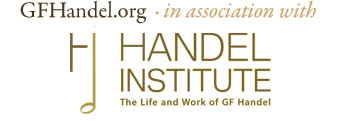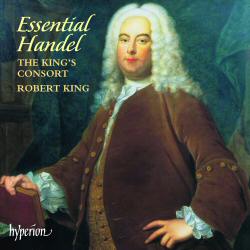This is not really the essential
Handel. But it can only be a good thing that those who only want the
so-called ‘Largo’ and bits of Messiah will be mystified by this.
However, it is extraordinary that there is not a single item representing
any of Handel’s operas. Despite the disc being a nicely packaged
introduction to Hyperion’s series of Handel discs by the King’s Consort,
this would still allow for any of the arias from their recording of
Ottone (Claron McFadden’s ‘Falsa imagine’ is among the most effective
I’ve ever heard), or room could have been found for an aria or two from the
fine recital disc with James Bowman (perhaps ‘Or la tromba’ from Rinaldo
or ‘Se parla nel mio cor’ from Giustino would have been more useful
here than some of the less overwhelming selections from oratorios). Nor is
Handel’s brilliant period in Italy represented at all.
Yet even if some of Robert King’s memorable
Handel recordings are seemingly forgotten (neither his lovely Acis &
Galatea and the Italian duets disc featuring Gillian Fisher and James
Bowman find any room here), this is a timely reminder of how Hyperion and
the King’s Consort have significantly enriched the Handel discography. The
emphasis of this collection is very heavily upon Handel’s later English
oratorios and odes. If this overlooks the drama and intensity one finds in
his operas, it is compensated for in the richness of gorgeous inventions
such as Robin Blaze’s poignant ‘Yet can I hear the dulcet lay’ (The
Choice of Hercules), the choir’s magnificent conclusion to ‘Or let the
merry bells ring round’ (L’Allegro, ll Penseroso ed il Moderato) and
Lynne Dawson’s beautiful ‘Hark! Hark! He strikes the golden lyre’ (Alexander
Balus), featuring Handel’s rare exotic use of mandolin and harp. It
conjures a mixture of textures that places Handel closer to Vivaldi than one
expects in an English oratorio from late in Handel’s career. I can imagine a
few innocent casual buyers of this disc being astonished and delighted by
the selections that show Handel’s gift for sublime poetic expression.
I am troubled by Hyperion’s insistent
presentation of the so-called ‘Un puro ardor’ from the 1736 cantata
Cecilia, volgi un sguardo as if it is an aria in its own right. It is
only a B section: robbed of the A section that should precede and follow it
the music becomes merely a disembodied moment of beauty without its glorious
context (it seems churlish to complain too much when Carolyn Sampson sings
it so exquisitely, but I do not think that encouraging people to think that
B sections are isolated compositions ought to become a habit). However, avid
Handel collectors will also find this compilation very enjoyable: even if
you have all of Robert King’s Handel recordings issued by Hyperion, this
sampler also includes two pieces that have not been commercially released
before. The melancholic Largo from Opus 3 No. 2, sensitively played by the
King’s Consort (although ending an extract on the dominant key makes for
uncomfortable listening if you are the sort of person who wants to hear a
concluding fast movement in the tonic key). Lorna Anderson and Crispian
Steele-Perkins give their all in a performance of ‘Let the bright seraphim’
that was previously distributed to the King’s Consort sponsors on a private
recording.
There have been few champions of
the less popular militaristic English oratorios Handel composed during the
second half of the 1740s. Robert King has done more than most to unearth the
treasures in Joshua, Judas Maccabaeus and The Occasional
Oratorio. Extracts from these will certainly please those who buy this
disc in order to have ‘Zadok the Priest’ and a few bits of the ‘Water Music’
and the Music for the Royal Fireworks. Indeed, this compilation will be
warmly received by those who resolutely regard Handel as a British icon
rather than as the disclipe of Alessandro Scarlatti, Corelli and Keiser. The
overall programme is not perfect, nor is each individual performance
strictly essential, but Robert King rarely lets Handel down. This is not
‘The Only Handel Album You’ll Ever Need’ (thank goodness Hyperion have not
gone down that disgusting marketing path unlike some of their more corporate
competitors), but it is enjoyable for both hardened Handelians and the
curious beginner alike. Hopefully it will earn Handel some new admirers.




